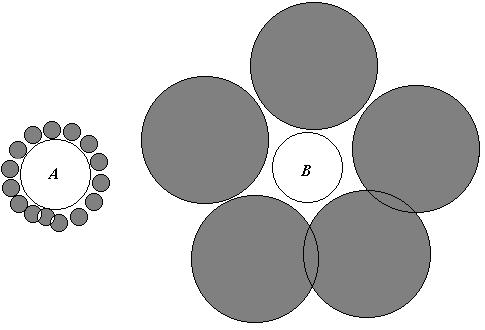The Ebbinghaus illusion is an optical illusion of relative size perception. If two circles of identical size are placed near to each other and one is surrounded by large circles and the other is surrounded by small circles, the second central circle will appear larger than the first central circle.
It was named for its discoverer, Hermann Ebbinghaus.

Circles A and B are exactly the same size; however, B seems smaller.
The Ebbinghaus illusion has played a crucial role in the recent debate over the existence of separate pathways in the brain for perception and action (for more details see visual cortex). It has been argued that the Ebbinghaus illusion distorts perception of size, but when a subject is required to respond with an action, such as grasping, no size distortion occurs (Goodale & Milner, 1992). However, recent work (Franz et al, 2005) suggests that the original experiments were flawed. The original stimuli limited the possibility for error in the grasping action, therefore making the grasp response more accurate, and presented the large and small versions of the stimulus in isolation - which results in no illusion because there is no second central circle to act as a reference. Franz et al conclude that both the action and perception systems are equally fooled by the Ebbinhaus illusion.
References
- Choplin, J. M., & Medin, D. L. (1999). Similarity of the perimeters in the Ebbinghaus illusion: Perception & Psychophysics Vol 61(1) Jan 1999, 3-12.
- Deni, J. R., & Brigner, W. L. (1997). Ebbinghaus illusion: Effect of figural similarity upon magnitude of illusion when context elements are equal in perceived size: Perceptual and Motor Skills Vol 84(3, Pt 2) Jun 1997, 1171-1175.
- Franz VH, Scharnowski F, Gegenfurtner (2005) Illusion effects on grasping are temporally constant not dynamic. J Exp Psychol Hum Percept Perform. 31(6), 1359-78
- Goodale & Milner (1992) Separate pathways for perception and action. Trends in Neuroscience, 15, 20-25.
Assessment |
Biopsychology |
Comparative |
Cognitive |
Developmental |
Language |
Individual differences |
Personality |
Philosophy |
Social |
Methods |
Statistics |
Clinical |
Educational |
Industrial |
Professional items |
World psychology |
Cognitive Psychology: Attention · Decision making · Learning · Judgement · Memory · Motivation · Perception · Reasoning · Thinking - Cognitive processes Cognition - Outline Index
| This page uses Creative Commons Licensed content from Wikipedia (view authors). |